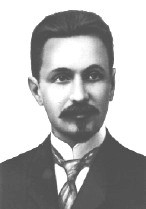Boris Lwowitsch Rosing
Boris Rosing ( Russian Борис Львович Розинг ., Scientific transliteration vovič Boris L'Rozing * April 23 . Jul / 5. May 1869 greg. In St. Petersburg ; † 20th April 1933 in Arkhangelsk ) was a Russian physicist , engineer and Pioneer in the field of television .
biography
Rosing graduated from high school in 1887 with a gold medal (highest distinction) and in 1891 studied at the physical-mathematical faculty of the University of Saint Petersburg with a first degree diploma. He initially stayed at the university to prepare for a professorship and taught at the Petersburg Technological Institute , and from 1895 at the Konstantinovsky Artillery School. At the same time, he actively promoted higher education for women and was a lecturer at the polytechnic courses for women, which opened in 1906 and which were converted into the Petrograd Polytechnic Institute in 1916.
Boris Rosing invented the first mechanism for reproducing the television image by he used the system of the line-wise transmission and reception apparatus, a cathode ray tube (developed by German inventor Ferdinand Braun ) einbaute. He thus de facto defined the main principle of modern television. In July 1907, his invention was officially registered as a "method of electrical transmission of images over distances". He got the patent No. 18076 and was awarded by the Russian Technical Society.
In 1908 and 1909 the invention of the new method of image reception was confirmed by further patents which Rosing received in England and Germany . In 1911, Rosing patented an improved television device in Russia, England, Germany, and the United States . On May 9, 1911, he succeeded in receiving the simplest geometric figures in his laboratory with a self-constructed kinescope, which meant the world's first television broadcast and heralded the era of television.
In 1920 Rosing organized a physical-mathematical society in Yekaterinodar , of which he became chairman. The society was a member of the Russian Physics Association and worked actively despite the turmoil of civil war and famine in the Russian south. Rosing published numerous works on the subject of vector analysis, photoelectric relays and transformations of the electric field. In 1922 he took part in the physics conference in Nizhny Novgorod and gave a lecture on the behavior of light quanta as a function of electromagnetic fields. A year later, in Petrograd, he published his major work called Electric Telescope (Television) - Tasks and Achievements.
Another Russian pioneer of television, Vladimir Sworykin , was one of Rosing's students . He emigrated to the USA, where he invented the iconoscope tube, the modern kinescope tube, based on Rosing's experiments, and worked on the development of the electron microscope .
In 1931, Rosing was arrested for allegedly "financing counter-revolutionary activities" because he had previously lent money to an acquaintance who was arrested. For this he was banished to an OGPU ULag labor camp in Kotlas , a small town in the far north, for three years . However, thanks to the advocacy of the Soviet and foreign scientific public, he was able to be transferred to Arkhangelsk in 1932, where he worked at the Department of Physics at the Arkhangelsk Forestry Institute. On April 20, 1933, Rosing died of a cerebral haemorrhage at the age of 63 . On November 15, 1957, the presidium of the Leningrad City Court ruled that the accusations against Rosing were unfounded and rehabilitated him posthumously.
Web links
- Biography of Boris Rosing (Russian)
- Article about Rosing (Russian)
- Article Boris Lwowitsch Rosing in the Great Soviet Encyclopedia (BSE) , 3rd edition 1969–1978 (Russian)
| personal data | |
|---|---|
| SURNAME | Rosing, Boris Lwowitsch |
| ALTERNATIVE NAMES | L'vovič Rozing, Boris; Розинг, Борис Львович (Russian) |
| BRIEF DESCRIPTION | Russian physicist, engineer and pioneer in the field of television |
| DATE OF BIRTH | May 5, 1869 |
| PLACE OF BIRTH | St. Petersburg |
| DATE OF DEATH | April 20, 1933 |
| Place of death | Arkhangelsk |
